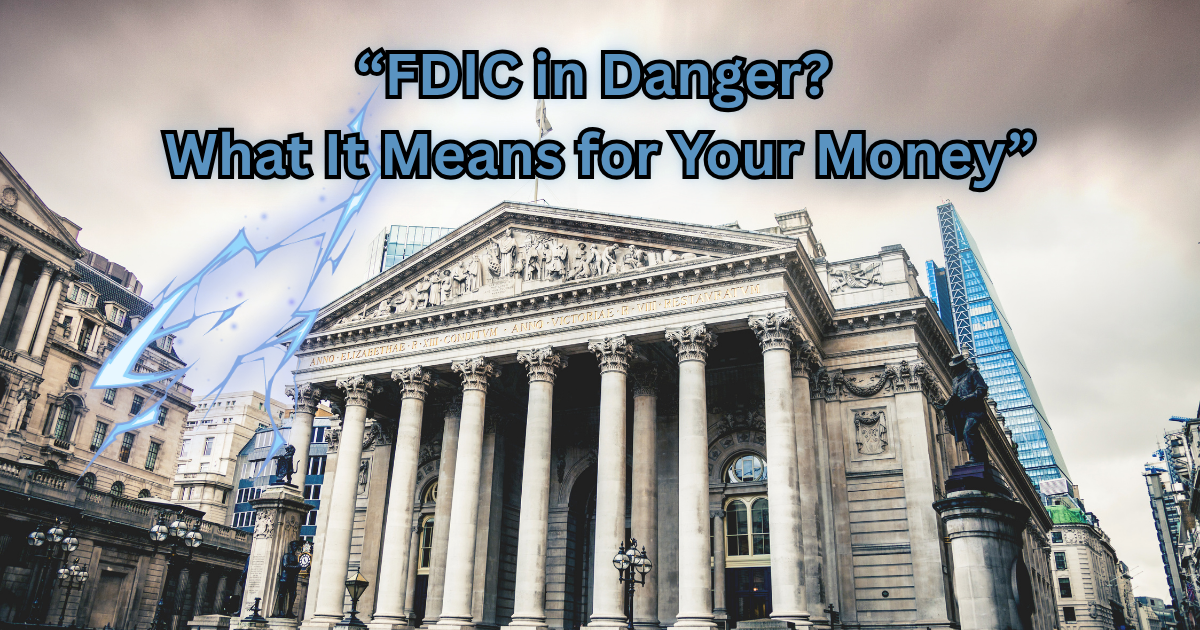“FDIC in Danger? What It Means for Your Money”

Worried about recent headlines asking, "FDIC in Danger? What It Means for Your Money!" It's normal to feel a bit uneasy when you hear about significant financial news, such as banks experiencing problems. But don't worry! We're here to help clarify the confusion about your money, how it's kept safe, and what this news means for you.
What Happened with Banks Recently?
In March 2023, several well-known banks, including Silicon Valley Bank and Signature Bank, encountered significant issues and failed within just two days. This occurred after they lost a considerable amount of money from investors, prompting people to rush to withdraw their funds. This created a wave of concern, and other major financial institutions, such as Credit Suisse and First Republic Bank, were also affected. It's important to remember that even these large banks are protected by the FDIC, but there are limits to that protection.
Are Credit Unions Different and Safer?
When it comes to keeping your money safe, credit unions generally pose a lower risk than banks, especially during financial crises. Here's how they're different:
- Who Owns Them? Banks are typically owned by shareholders and serve a diverse range of customers, including large investors and corporations. Credit unions, on the other hand, are owned by their members and are not-for-profit organizations. Their main goal is to serve their members and a smaller, more local community.
- How They're Insured: Your money in a bank is insured by the Federal Deposit Insurance Corporation (FDIC). Credit unions are not FDIC-insured. Instead, they are insured by the National Credit Union Administration (NCUA) through the National Credit Union Share Insurance Fund (NCUSIF). Both the FDIC and the NCUA insure individual accounts for up to $250,000. You'll often see the NCUA logo on a credit union's website, showing your money is protected.
- Risk They Take: Credit unions usually take much lower risks than banks. This is because they focus on serving individuals and small businesses, rather than big, high-risk investors. For example, U.S. banks, on average, have 36% of their assets uninsured, while credit unions have only 9% uninsured. Silicon Valley Bank, one of the banks that failed, had a huge 90% uninsured risk. Because credit unions are not-for-profit, they can also offer better interest rates on savings accounts and lower loan costs compared to banks.
Is Your Money Safe?
Yes, for most people, your money is very safe in a bank or credit union.
- Insurance Limit: Both FDIC and NCUA insurance protect your accounts up to $250,000. This means if you have less than $250,000 in your account, it's fully protected even if the institution fails.
- Spreading Your Money: If you have more than $250,000, you can spread your money across multiple accounts at different banks or credit unions to keep it all insured. You can also have other types of accounts (such as a solo checking account, a solo savings account, and a joint account) at the same institution, and each may be insured separately up to $250,000.
- What Happens When a Bank Fails? Bank failures are usually handled quickly by regulators. Often, a different bank takes over the accounts, and customers experience little to no interruption in accessing their money, sometimes reopening within a few days.
Beyond Banks: Other Ways to Protect Your Money
While banks and credit unions are great for most of your money, there are other strategies for different situations:
- High-Yield Accounts: If you want to earn more interest than a regular savings account, consider a money market account or a Certificate of Deposit (CD). These often offer higher interest rates and are still insured by the FDIC or NCUA.
- Peer-to-Peer (P2P) Lending: You can lend money directly to other individuals, and some services offer returns of 5% to 10%. However, P2P lending accounts are NOT FDIC-insured, so there's a risk you could lose your money. This is a higher-risk option.
- Storing Cash at Home: It's a good idea to keep a small amount of cash at home for immediate emergencies. Use a good fireproof safe to protect against fire and theft. Consider a safe with a biometric lock for quick, secure access. Store cash in waterproof containers to prevent damage from moisture. Hide emergency cash in multiple, clever spots around your home, like hollowed-out books or fake outlets. Remember, privacy is key; the fewer people who know about your hidden cash, the safer it is. Don't keep too much cash at home; large amounts are safer in insured financial institutions, as they are protected from theft, loss, and losing value due to inflation.
- Retirement Accounts: Your retirement accounts, like 401(k)s and IRAs, already have creditor protection under federal law. Please be aware that investments like cryptocurrency are not insured by the FDIC or SIPC and are considered high-risk; only invest what you are willing to lose.
Conclusion
The recent news about banks might have made you think your money is in danger, but it's important to remember the strong protections in place. For most people, their money in banks and credit unions is very safe thanks to federal insurance. Credit unions offer a community-focused, lower-risk alternative that often provides better rates. By understanding how these systems work and diversifying where you keep your money, you can feel confident and secure about your hard-earned cash.
Take Action!
Want to learn more about keeping your money safe and making wise financial choices? Consider speaking with a trusted adult or exploring options such as joining a local credit union. Every step you take to understand your money helps you build a more secure future!
Frequently Asked Questions
- Are credit unions federally insured? Yes, credit unions are federally insured by the National Credit Union Administration (NCUA).
- How much money is insured in a bank account? Both banks (FDIC) and credit unions (NCUA) insure individual accounts up to $250,000.
- Is it safe to keep a lot of cash at home? While it's practical to have some cash on hand for emergencies, storing large amounts at home carries risks such as theft, loss, and depreciation due to inflation. It's generally safer to keep most of your money in insured bank accounts.
- What happens if my bank closes? If a bank closes, regulators like the FDIC usually step in quickly. Often, another bank takes over, and customers typically experience little to no interruption in their banking services.











